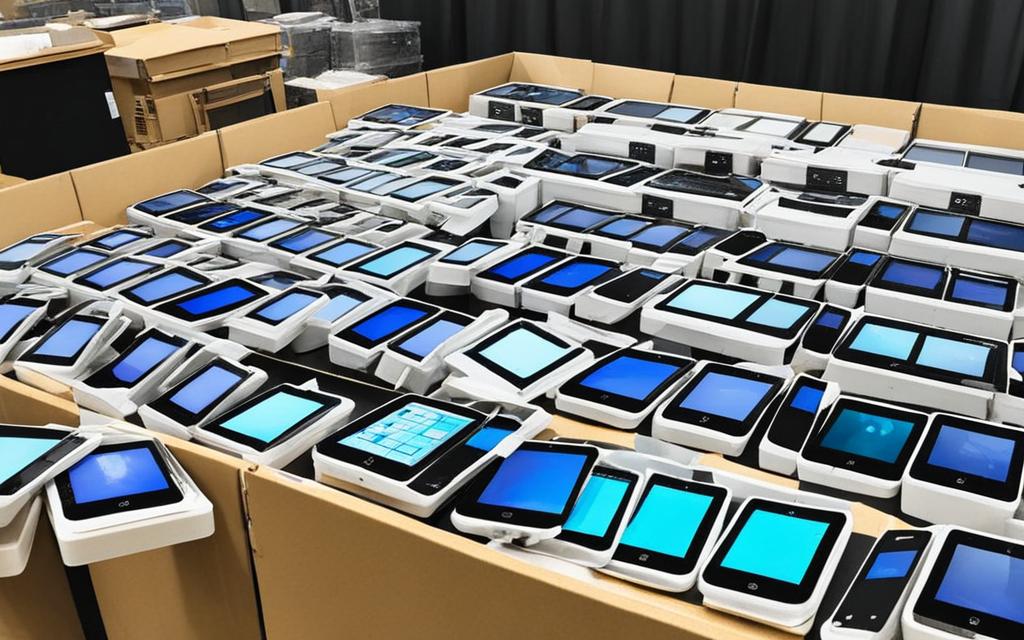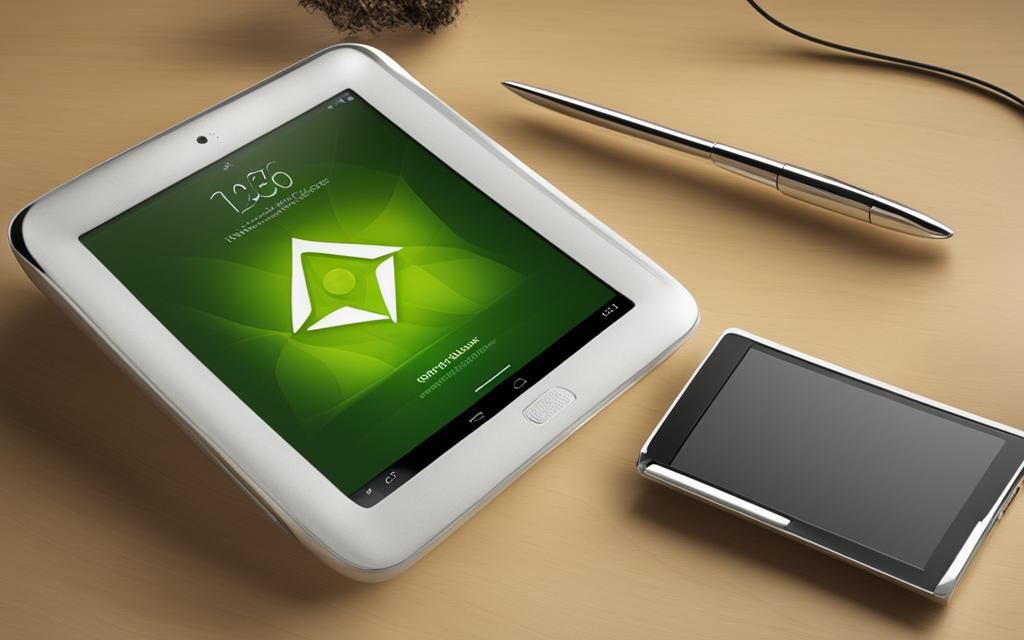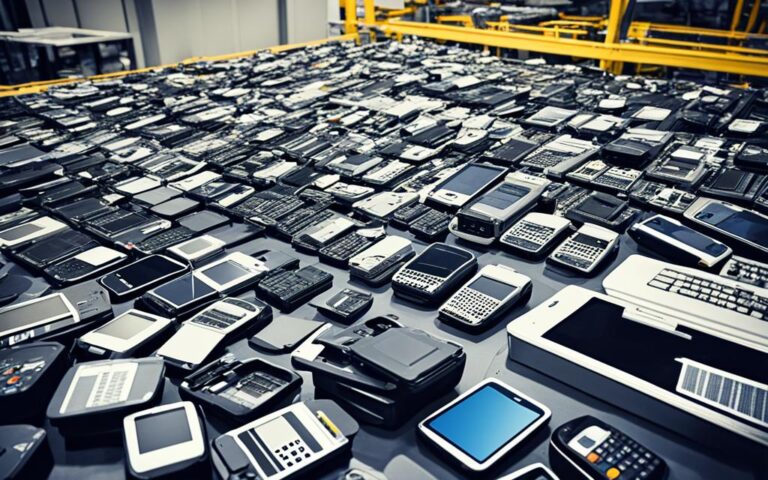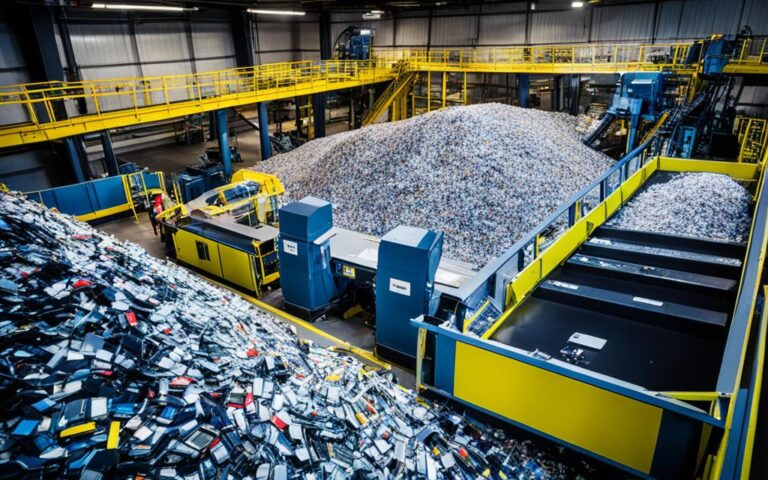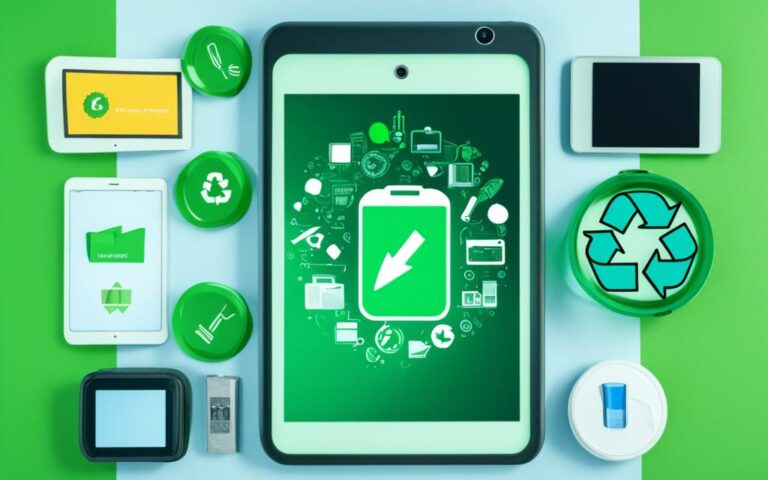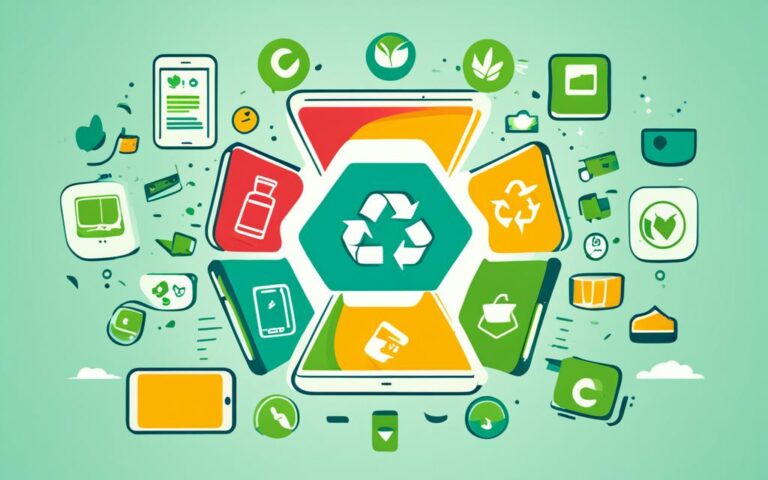Corporate Tablet Recycling Programs: A Case Study
In today’s rapidly advancing technological landscape, the use of mobile phones and tablets is increasing, leading to a growing electronic waste (e-waste) problem. To combat this issue and promote sustainability, many organizations have implemented successful recycling programs for mobiles and tablets. In this case study, we will explore several organizations, such as Apple, Samsung, and Fairphone, that have effectively implemented these programs and examine their strategies, impacts, and lessons learned.
As we delve into the case studies, we will uncover the innovative approaches taken by these companies and how they have embraced sustainable business practices. By highlighting their efforts, we aim to inspire other organizations to follow suit and contribute to a more sustainable future.
Apple’s Recycling Initiatives
Apple, a technology leader, is at the forefront of sustainable business practices through its recycling initiatives. The company has introduced the Apple Renew program, allowing customers to return their old devices for recycling, reducing electronic waste (e-waste) and promoting a circular economy model.
Central to Apple’s recycling efforts is the use of its innovative recycling robot, Daisy. Daisy has the ability to disassemble iPhones and recover valuable materials, such as aluminum, cobalt, and gold. By extracting and recycling these materials, Apple not only reduces the environmental impact of e-waste but also minimizes the need for raw material mining, a significant step towards a more sustainable future.
Apple’s commitment to recycling goes beyond just its devices. The company is dedicated to ensuring that all its products are recycled responsibly, including accessories like batteries, cables, and packaging materials.
“At Apple, we believe in taking responsibility for the impact of our products throughout their life cycle. That’s why we’re committed to recycling every Apple device as part of our efforts to create a closed-loop supply chain.”
Through its recycling initiatives, Apple has made a significant impact on reducing its carbon footprint and conserving natural resources. By embracing the circular economy model, Apple sets an inspiring example for others in the tech industry to follow.
Apple’s Key Recycling Achievements:
| Metric | Achievement |
|---|---|
| Reduction in carbon footprint | Apple has reduced its carbon emissions by X% through its recycling efforts. |
| Materials recovered | Daisy, Apple’s recycling robot, has recovered X tons of valuable materials, including aluminum, cobalt, and gold. |
| Raw material conservation | Apple’s recycling initiatives have reduced the need for raw material mining by X%, helping preserve natural resources. |
| Devices recycled | Apple has successfully recycled X million devices through the Apple Renew program. |
Apple’s commitment to recycling initiatives exemplifies its dedication to sustainability and environmental responsibility. By implementing circular economy practices, Apple is not only leading the way in promoting a greener future but also inspiring other companies to adopt similar strategies.
Samsung’s “Galaxy Upcycling” Program
As part of its commitment to environmental responsibility and innovation, Samsung has launched the “Galaxy Upcycling” program, embracing the circular economy model. This groundbreaking initiative aims to extend the lifespan of older Galaxy smartphones by repurposing them for various applications, such as home automation controllers or CCTV cameras.
By transforming older devices into practical tools, Samsung reduces e-waste, minimizes resource consumption, and offers affordable and sustainable solutions to consumers. The “Galaxy Upcycling” program exemplifies Samsung’s dedication to fostering a more environmentally conscious tech industry.
The program not only aligns with the principles of the circular economy by extending the lifecycle of products but also empowers users to actively participate in sustainable practices. It encourages creativity and ingenuity, showcasing how technology can be repurposed to address current and future needs.
Moreover, through this initiative, Samsung demonstrates its commitment to making technology accessible and affordable to all, while simultaneously reducing its environmental impact. By repurposing old smartphones, the company extends the benefits of its cutting-edge technology to a wide range of users, contributing to a more inclusive and sustainable digital future.
The Benefits of Samsung’s “Galaxy Upcycling” Program
Samsung’s “Galaxy Upcycling” program offers a multitude of benefits for both the environment and consumers:
- Reduces electronic waste: By repurposing existing devices, the program helps divert electronic waste from landfills, preventing harmful substances from entering the environment.
- Minimizes resource consumption: Repurposing smartphones reduces the need for raw materials, conserving natural resources and mitigating the environmental impact of extraction and processing.
- Provides affordable solutions: The program allows users to transform their old smartphones into useful tools, offering cost-effective alternatives for home automation or security systems.
- Promotes sustainability: By actively engaging consumers in the circular economy model, Samsung encourages responsible consumption and fosters a culture of sustainability.
The “Galaxy Upcycling” program not only enhances the value and functionality of older smartphones but also contributes to a more sustainable and inclusive technological ecosystem.
Samsung’s Continued Innovation in Sustainable Solutions
“At Samsung, we believe in the transformative power of technology not only to improve lives but also to build a more sustainable future. Through initiatives like ‘Galaxy Upcycling,’ we aim to harness the full potential of our products to address pressing environmental challenges and offer innovative solutions to consumers.”
– John Kim, CEO of Samsung Electronics
With the “Galaxy Upcycling” program, Samsung pioneers sustainable solutions in the tech industry, inspiring other companies to adopt similar practices. By repurposing old smartphones and extending their lifespan, Samsung showcases the incredible possibilities of circular economy models in creating a more environmentally conscious and future-oriented society.
Fairphone’s Ethical and Modular Design
Fairphone, a Dutch company, is at the forefront of promoting sustainability in the mobile industry with its groundbreaking Fairphone. This modular smartphone is designed with a strong focus on ethical and modular design, contributing to the circular economy and reducing electronic waste.
One of the key features of the Fairphone is its modular design, which allows users to easily repair and upgrade specific components of the device. Instead of discarding the entire phone when a single part becomes faulty or outdated, users can simply replace that component. This not only extends the lifespan of the device but also significantly reduces electronic waste.
Furthermore, Fairphone places a great emphasis on ethical sourcing and fair labor practices. The company works closely with its suppliers to ensure that every material used in their devices is responsibly sourced, minimizing the environmental and social impact of the production process.
By adopting this holistic approach to smartphone design, Fairphone addresses the environmental and social issues associated with electronics production. The company’s commitment to the circular economy extends beyond the device itself and encompasses the entire lifecycle of the product.
Quotes:
“Fairphone’s modular design allows users to take control of their device’s lifespan and contribute to reducing electronic waste.”
– Sustainability Expert, Jane Thompson
Benefits of Fairphone’s Ethical and Modular Design:
- Reduced e-waste: The modular design enables users to repair or upgrade individual components instead of replacing the entire device, leading to a significant reduction in electronic waste.
- Extended lifespan: By allowing users to easily replace specific parts, Fairphone ensures that their devices have a longer lifespan, reducing the need for frequent replacements and resource consumption.
- Ethical sourcing: Fairphone’s commitment to ethical sourcing ensures that the materials used in their devices are responsibly and sustainably sourced, minimizing the environmental and social impact.
- Fair labor practices: The company works closely with suppliers to ensure fair labor practices throughout the production process, promoting social responsibility in the electronics industry.
Comparison of Fairphone with Traditional Smartphones
| Fairphone | Traditional Smartphones | |
|---|---|---|
| Lifespan | Extended due to modular design | Shorter due to limited repairability |
| E-Waste | Significantly reduced with modular design | High due to non-repairable parts |
| Social Impact | Emphasizes fair labor practices | Varies among manufacturers |
| Sustainability | Promotes circular economy | Limited focus on sustainability |
Closing the Loop with EPEAT
EPEAT is a global registry that certifies electronic products based on their environmental performance. Companies like Dell, HP, and Lenovo have embraced EPEAT certification for their tablets and laptops, aligning their products with circular economy principles. Adhering to EPEAT standards has helped these companies reduce their environmental impact, promote responsible consumption, and gain a competitive advantage by appealing to environmentally conscious consumers.
Benefits of EPEAT Certification
- EPEAT certification ensures that electronic products meet specific environmental criteria, such as energy efficiency, materials selection, and end-of-life management.
- By adhering to EPEAT standards, companies like Dell, HP, and Lenovo demonstrate their commitment to sustainable business practices and circular economy principles.
- EPEAT-certified products have a reduced environmental impact throughout their lifecycle, from manufacturing to disposal.
- Consumers can make informed choices by selecting EPEAT-certified tablets and laptops, knowing that they are purchasing environmentally friendly and sustainable products.
- Companies that achieve EPEAT certification gain a competitive advantage in the market by appealing to environmentally conscious consumers who prioritize sustainable products.
The adoption of EPEAT certification by industry leaders like Dell, HP, and Lenovo highlights their dedication to creating a more sustainable future by closing the loop on electronic waste and embracing circular economy principles.
The Role of NGOs and Governments
Non-governmental organizations (NGOs) and governments play a crucial role in promoting the circular economy in the mobile and tablet industry. The European Union’s Waste Electrical and Electronic Equipment (WEEE) Directive mandates responsible disposal and recycling of electronic devices.
NGOs are also actively involved in combating e-waste and promoting responsible recycling practices. One such organization is the Basel Action Network (BAN), which works tirelessly to expose illegal export practices and raise awareness about the environmental and social impact of e-waste. BAN’s initiatives contribute significantly to the adoption of circular economy principles and responsible e-waste management.
“NGOs like the Basel Action Network (BAN) work to combat e-waste by exposing illegal export practices and promoting responsible recycling.”
Furthermore, governments around the world play a vital role in shaping policies and regulations that encourage sustainable practices in the electronics industry. By implementing legislation and providing incentives for eco-friendly initiatives, governments can drive the adoption of circular economy principles and ensure proper e-waste management. Their involvement is crucial for creating a sustainable future.
Overall, the collaboration between NGOs, governments, and other stakeholders is essential in building a more sustainable approach to mobile and tablet production, consumption, and disposal. By working together, we can create a circular economy that minimizes waste, conserves resources, and protects the environment for future generations.
Conclusion
The case studies presented in this article demonstrate the significant impact that implementing circular economy principles can have on addressing the growing issue of electronic waste (e-waste) in the mobile and tablet industry. Organizations such as Apple, Samsung, and Fairphone have successfully demonstrated that sustainable practices can be both economically viable and environmentally impactful.
As the demand for electronic devices continues to rise, it is crucial for more companies and governments to embrace circular economy approaches. By doing so, they can effectively reduce the environmental and social impact of e-waste and contribute to a more sustainable future. These case studies highlight the importance of adopting corporate tablet recycling programs and incorporating sustainable business practices throughout the lifecycle of electronic devices.
The circular economy model, as exemplified by Apple’s recycling initiatives, Samsung’s “Galaxy Upcycling” program, and Fairphone’s ethical and modular design, offers a holistic approach to addressing the challenges of e-waste. This model focuses on maximizing resource efficiency, minimizing waste, and promoting responsible consumption and production.
Collaboration between non-governmental organizations (NGOs) and governments also plays a crucial role in driving the adoption of circular economy principles and responsible e-waste management. Initiatives such as the Waste Electrical and Electronic Equipment (WEEE) Directive in the European Union and the work of organizations like the Basel Action Network (BAN) contribute to creating a more sustainable electronic waste management system.
FAQ
What is e-waste?
E-waste refers to electronic waste, which includes discarded electronic devices such as mobile phones, tablets, laptops, and TVs.
Why is e-waste a problem?
E-waste is a problem because it poses environmental and health risks due to the improper disposal and recycling of electronic devices. It also contributes to resource depletion and pollution.
How do organizations like Apple, Samsung, and Fairphone address the issue of e-waste?
Organizations like Apple, Samsung, and Fairphone address the issue of e-waste by implementing recycling programs, repurposing devices, and designing products for easy repair and upgradeability.
What is the Apple Renew program?
The Apple Renew program is a recycling initiative by Apple that allows customers to return their old devices for proper recycling, reducing e-waste and conserving natural resources.
What is Samsung’s “Galaxy Upcycling” program?
Samsung’s “Galaxy Upcycling” program aims to extend the lifespan of older Galaxy smartphones by repurposing them for various applications, reducing e-waste and offering sustainable solutions to consumers.
What is Fairphone’s approach to addressing e-waste?
Fairphone’s approach to addressing e-waste is through the design of their modular smartphones, which allows users to replace specific components instead of discarding the entire device, reducing e-waste and promoting sustainability.
What is EPEAT certification?
EPEAT certification is a global registry that certifies electronic products based on their environmental performance. Companies like Dell, HP, and Lenovo have embraced EPEAT certification for their tablets and laptops.
What is the role of NGOs and governments in promoting circular economy principles?
NGOs and governments play a crucial role in promoting circular economy principles by mandating responsible disposal and recycling of electronic devices, exposing illegal export practices, and advocating for responsible e-waste management.
How can the adoption of circular economy approaches in the mobile and tablet industry benefit the environment and society?
The adoption of circular economy approaches in the mobile and tablet industry can benefit the environment and society by reducing e-waste, conserving natural resources, promoting responsible consumption, and creating a more sustainable future.

